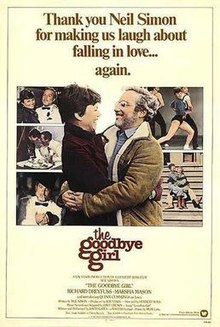The Goodbye Girl
| The Goodbye Girl | |
|---|---|

Theatrical release poster
|
|
| Directed by | Herbert Ross |
| Produced by | Ray Stark |
| Written by | Neil Simon |
| Starring |
Richard Dreyfuss Marsha Mason Quinn Cummings |
| Music by | Dave Grusin |
| Cinematography | David M. Walsh |
|
Production
company |
|
| Distributed by |
Warner Bros. Metro-Goldwyn-Mayer |
|
Release date
|
|
|
Running time
|
110 minutes |
| Country | United States |
| Language | English |
| Box office | $102 million |
The Goodbye Girl is a 1977 American romantic comedy-drama film. Produced by Ray Stark and directed by Herbert Ross, the film stars Richard Dreyfuss, Marsha Mason, Quinn Cummings, and Paul Benedict. The original screenplay by Neil Simon centers on an odd trio: a struggling actor who has sublet a Manhattan apartment from a friend, the current occupant (his friend's ex-girlfriend, who has just been abandoned), and her precocious young daughter.
Richard Dreyfuss won the 1977 Academy Award for Best Actor for his performance as Elliot Garfield. At the time he became the youngest man to win an Oscar for Best Actor.
Dancer Paula McFadden (Marsha Mason) and her ten-year-old daughter Lucy (Quinn Cummings) live in a Manhattan apartment with her married boyfriend, Tony DeForrest, until one day, he deserts her to go act in a movie in Italy. Before he left and unbeknownst to Paula, Tony subleased the apartment to Elliot Garfield (Richard Dreyfuss), a neurotic but sweet aspiring actor from Chicago, who shows up in the middle of the night expecting to move in. Though Paula is demanding, and makes clear from the start that she doesn't like Elliot, he allows her and Lucy to stay.
Paula struggles to get back into shape to resume her career as a dancer. Meanwhile, Elliot has landed the title role in an off-off-Broadway production of Richard III, but the director, Mark (Paul Benedict), wants him to play the character as an exaggerated stereotype of a homosexual, in Mark's words, "the queen who wanted to be king." Reluctantly, Elliot agrees to play the role, despite full knowledge that it may mean the end of his career as an actor. Many theater critics from television stations and newspapers in New York City attend opening night, and they all savage the production, especially Elliot's performance. The play quickly closes, much to his relief.
...
Wikipedia
